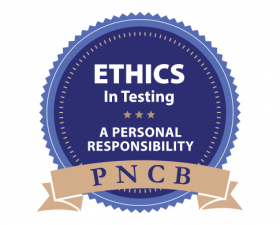Ethics in Testing: A Personal Responsibility Toolkit
Is a certification exam in your future? Do you support others planning to test?
Everyone wants to be successful when taking a board certification exam. Those in roles supporting testers want a passing outcome too. But do you know what you can and can’t say about exam content?
PNCB offers this exam ethics toolkit to clarify what specific behaviors and practices are allowed or prohibited when it comes to sharing information about exam content. Use and share these resources to see policies and specific examples. You can even earn CE or integrate tips into review classes and academic settings.
Don’t risk the consequences—for yourself or other nurses. Do your part to support ethics in testing and protect credentials from revocation. Moreover, unethical exam behaviors hurt the profession and allows people to pass who may not pass otherwise.
Certification’s reach extends well beyond nursing professionals. Each of us has a personal commitment to uphold exam ethics because employers, patients, and families count on the integrity of nursing care and the credentials that validate specialized practice knowledge.
Who benefits from the tools?
- Students and Exam Candidates
- Recent Testers and Established Certificants
- Faculty, Mentors, Review Course Instructors, and Other Influencers
Toolkit Resources
PNCB’s Code of Ethics states you cannot act dishonestly or unfairly to personally gain advantage or provide advantage to another during the examination or recertification process.
To give feedback or ask questions, contact exam@pncb.org. We also offer an anonymous tip reporting form.
- Watch and share a video explaining what conversations are acceptable
- Earn 1 contact hour with our free Exam Ethics CE module
- Share the PNP student slides in your curriculum
- Present the review course attendee slides when preparing RNs or NPs
- Understand ethical behaviors before, during, and after the testing process
- See strategies to stop or redirect questionable or prohibited conversations
- Identify brain dumping and learn about consequences
- Explore how certification exams are created, including time and cost to develop and maintain 4 PNCB exam programs
PNCB Test Security Measures & Consequences
PNCB is serious about upholding test security and protecting its intellectual property. Exam ethics violations impact the organization, you, other nurses, the profession, and public trust.
PNCB test security measures include but are not limited to:
- Data forensics consultants
- Web patrols that search for copyrighted exam material
- Anonymous online tip reporting form
If an exam candidate or certificant violates PNCB’s Code of Ethics or engages in unethical behaviors related to exam content, PNCB may:
- Stop an in-progress exam
- Delay release of score results beyond advertised timeframe
- Invalidate exam scores
- Suspend or revoke certification
- Prohibit future exam attempts for the people involved
- Take legal action
- Report lapse of certification to state boards of nursing
Use your influence
Exam integrity is everyone’s concern.
Make sure that you, your colleagues, and future exam candidates are aware of the language in PNCB’s Code of Ethics.
Acting dishonestly or unfairly to personally gain advantage or provide advantage to someone planning to test is strictly prohibited and can jeopardize certification status or eligibility to test status for any involved parties. A certification board can stop an exam for everyone if any content is compromised.
All candidates attest that they agree not to disclose or communicate about exam questions with others:
- It is forbidden under federal copyright law to copy, reproduce, record, distribute, or display these examination questions by any means, in whole or in part. Doing so may subject you to severe civil and criminal penalties.
- As an exam candidate, you agree not to share information about test questions and answers in any way.
- This includes talking about questions with your colleagues, supervisors, mentors, or teachers.
- Violation of this confidentiality agreement can jeopardize your certification or opportunity to become certified in the future.
- Protect yourself, your colleagues, and the credential by not discussing test questions with anyone.



